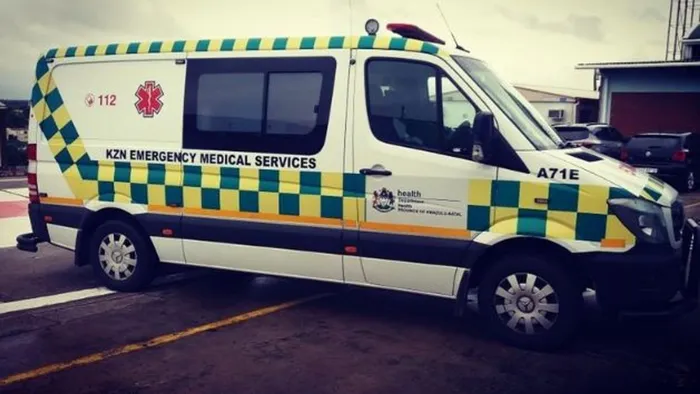‘Dysfunctional’ government contract blamed for critical shortage of ambulances and police vehicles in KZN

Only 50% of KwaZulu-Natal Department of Health ambulances are operational according to a response to parliamentary questions.
Image: File
A key government contract, central to the provincial government's management of its fleet of vehicles, has been blamed for the severe shortage of ambulances and police vehicles to service communities.
Members of the provincial legislature have expressed worries about the RT46 transversal tender, fearing it is at the heart of the shortage of government vehicles, including ambulances and police vehicles.
The “RT46 transversal tender” is described as a series of South African government tenders managed by the National Treasury (in 2021) to provide comprehensive vehicle fleet management services to government entities. These tenders cover services like fuel card provision, fleet tracking, maintenance, repair, and traffic fine management, aiming to control costs and improve efficiency for government-owned vehicles.
Concerns have been raised regarding the dysfunction of the tender, with MPLs claiming that the bureaucratic processes are causing delays that lead to simple vehicle repairs taking months.
Legislators highlighted their concerns following a visit to the Department of Health Emergency Services, where they found a serious shortage of ambulances. Recent parliamentary questions on the matter revealed the extreme seriousness of the situation, indicating that only 240 (50%) of KwaZulu-Natal’s 480 Department of Health (DoH) ambulances were operational.
Statements by MPLs, as well as confidential reports seen by The Mercury from the SAPS, show that the challenges resulting from the contract affect both medical services and crime fighting.
The SAPS report indicates dissatisfaction with how the contract is managed, with hundreds of their vehicles waiting to be repaired. Health MEC Nomagugu Simelane’s department recently announced that it is entering into a partnership with private ambulance services to ensure timely and quality access to emergency medical services.
The impact is potentially wider than health services and could also be affecting the SAPS in the province.
IFP MPL and Finance Committee member Lourens de Klerk stated, “I think there should be an investigation by the legislature into this transversal tender because, with our oversight on the EMS ambulance services, it was clear there were serious shortcomings, especially regarding the lack of ambulances and the delays in fixing them. It is important that we call for such an investigation to be conducted.”
KwaZulu-Natal Scopa chairperson Tim Brauteseth expressed concerns about the impact that the contract is having, especially on the management of the fleet within the Health Department.
Brauteseth said they are “gravely concerned about the ongoing dysfunction in managing KZN government vehicle fleets under the RT46 transversal tender, particularly regarding the devastating impact on policing and emergency medical services in the province.”
“The RT46 contract was intended to streamline vehicle fleet management across government departments. Instead, it has become a bottleneck of inefficiency, exclusion, and economic devastation,” he said.
Chairperson of the KZN Health Portfolio Committee, Dr Imran Keeka, said the situation is very serious for the Department of Health.
“Emergency services exist for one reason: to reach people in time. This is to save lives. Right now, patients are dying while waiting, mothers are giving birth on their floors, and the injured are left to suffer because help is delayed. This contract has tied KZN’s emergency services’ hands behind their backs and forced them to their knees.”
He said KZN emergency services are in a dire state, with ambulances lingering on the floors of workshops, slashing the fleet on our roads to a third on some days. In uMgungundlovu, they found one ambulance standing idle since February as it needed a fan belt.
“This contract and the manner in which it is administered places unbearable strain on the few vehicles still in service, with no rotation possible, leading to climbing mileage, increased breakdowns, and escalating delays. If one of these ambulances crashes or has a glitch, it ultimately translates to a deterioration of response times—over and above the current state of delays.”
Finance MEC François Rodgers stated, “It is a fleet management contract managed by the National Treasury. I have not been briefed. However, KZN’s challenge remains the slow turnaround time with vehicle maintenance and repairs, particularly in the area of EMRS and ambulances.”
A recent report tabled by the SAPS in KZN to the members of the National Council of Provinces details the challenges faced by the department in repairing their vehicles, most attributed to this contract.
It stated, “Physical resources, particularly vehicles, are also affected by budgetary constraints. The rising cost of vehicles has outpaced the allocated procurement budget, resulting in a reduced number of vehicles being acquired and limiting mobility and response capacity.
“The current transversal contract for vehicle management and repairs (RT 46/2021) has also proven problematic, with poor service delivery from the appointed service provider impacting fleet availability and maintenance turnaround times.”
It showed that at the time, there were 1 473 police cars in need of repairs, and about 870 were being managed under this contract. It indicated that under the contract, 360 of their vehicles had been sitting in garages for less than 30 days awaiting repairs, 150 had been there for between 30 and 60 days, 280 had been gathering dust for 61 to more than 80 days, and 90 had been sitting idle there for more than 90 days.
Related Topics: